| |
Chicken Poop
By Jane Gilbertsen
Inside the Deer Fence
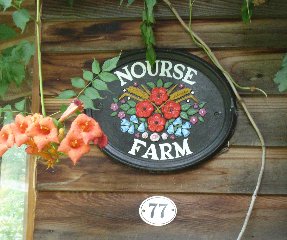 This is our farm sign. Our place is named after my husband's family's second farm in Westboro, Massachusetts. The second farm is the oldest family farm in America. We are some of the "western cousins". The second farm property supported the family for over 300 years. The first farm is a museum in Salem. We, of course, dabble only and are privileged to have the Red Apple/Hanks available should weird weather take down some of our "crops". This is our farm sign. Our place is named after my husband's family's second farm in Westboro, Massachusetts. The second farm is the oldest family farm in America. We are some of the "western cousins". The second farm property supported the family for over 300 years. The first farm is a museum in Salem. We, of course, dabble only and are privileged to have the Red Apple/Hanks available should weird weather take down some of our "crops".
The flower on the left of the photo is trumpet creeper (common name) or Campis radicans (scientific name). It is hard to get started as winter takes it to the ground until a warm winter allows the main vine- trunk to winter over. When the trunk has a couple years of maturity it does not readily freeze back to the ground. Its growth power resembles the wisteria. When mature in a warmer climate it could lift a house. This is one of the plants that in its native area, the Southeastern USA, is almost noxious spreader. 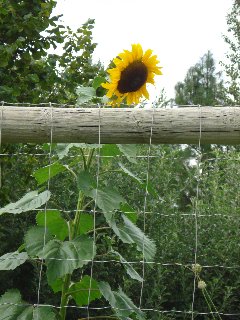 It is also called cow- itch because it is supposedly itchy. I haven't handled mine without gardening gloves. In our cold climate it is safe to try it. I prune out a few stringers enclosing my greenhouse door but otherwise, all I do is prune in the fall to keep the vines off the roof for a clear snow slide and prune again in the spring for good shaping. I love the gnarly trunk. It is also called cow- itch because it is supposedly itchy. I haven't handled mine without gardening gloves. In our cold climate it is safe to try it. I prune out a few stringers enclosing my greenhouse door but otherwise, all I do is prune in the fall to keep the vines off the roof for a clear snow slide and prune again in the spring for good shaping. I love the gnarly trunk.
This year I used my chicken poop as fertilizer. Do you think I used too much? This sunflower is behind my 8 foot deer fence. I planted seeds from last years flowers. I managed to keep a few from the finches and chickadees. Most years after I harvest a few seeds for the next year, I take the seed heads off the dilapitated plants and tuck them into the fence wire so the birds can pick them entirely clean. If your birds are voracious you can paper bag the seed heads to keep some seeds and the heads will ripen without predation.
The third picture shows my tomatoes in the middle, corn and purple amaranth in the back. The tomatoes plants have incredible vegetative growth but hardly any tomatoes. I know that chicken poop is nitrogen heavy but so is rain/lightning. Between the 2 of them and the wonderful rain something has really got many of my plants going crazy. Too much nitrogen feeds the plant at the expense of the friut. Of course, given the slow spring I must have been nuts cause I also planted everything way too too close. It just seemed like nothing was happening so I 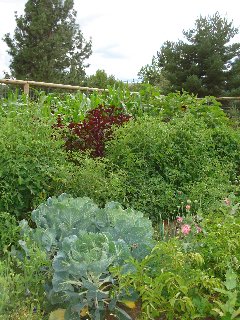 keep adding. Now I can't possibly get into this garden to harvest something without stepping on something else. The growth is so huge at least the weeds are discouraged. No light to germinate or grow. Next year, I will leave decent paths (I say that every year though and look at the mess I have now). keep adding. Now I can't possibly get into this garden to harvest something without stepping on something else. The growth is so huge at least the weeds are discouraged. No light to germinate or grow. Next year, I will leave decent paths (I say that every year though and look at the mess I have now).
I was somewhat gratified to learn of others, like Tom Forker, that have lots of vegetative growth but few tomatoes coming along. He didn't use his chicken manure. Could the atmospheric nitrogen fixed by our amazing lightning storms really have done this? Anybody else out there with similar experiences, particularly with their tomatoes?
Whatever else is going on, the rain has been wonderful for my berries. I have worked for years on making my soil more acid for blueberries. We love blueberries but unless the native soil is seriously amended regularily with acidic compost and/or ammonium sulphate and fertilized regularily with Miracid fertilizer (non- organic but free of contaminates) blueberries are a lost cause. I started the beds years ago with gutter cleanings from our Redmond house. The gutters were filled with fir and hemlock needles, very well rotted. When I "remodeled" the raised beds inside the deer fence, Bergen Brell and I moved the amended soil as well as the plants. Each year I use ammonium sulphate or sulfur to lower the soil pH. Ammonium sulphate is a worm killer. I don't know about just sulfur but it is a traditional pesticide. It was called brimstone historically as in "fire and brimstone". Just based on its old name I would say worms don't have a chance. Miracid is a wonderful fast acting fertilizer. It is a foliar feeder which means when it is dissolved in water and sprinkled on the plant leaves it is instantly absorbed by the plant leaves so it works pretty much like rain accompanied by lightning.
T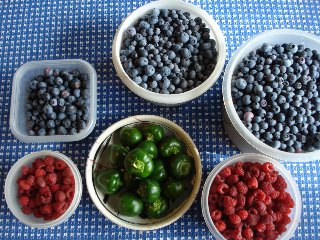 he raspberry plants came from the Massachusetts Nourse Farm Nursery. The family now operates a tissue culture berry nursery. Cloned nursery stock is disease free. They grow out the plants on the best soil in the country. The growing fields were originally used for growing the finest tobacco leaves for cigar wrappers. They had to be perfect. Tobacco is a natural and very toxic pesticide in itself. I don't know what is does to soil health but the berries grow magnificently now. The mail order raspberry canes came thick and strong. he raspberry plants came from the Massachusetts Nourse Farm Nursery. The family now operates a tissue culture berry nursery. Cloned nursery stock is disease free. They grow out the plants on the best soil in the country. The growing fields were originally used for growing the finest tobacco leaves for cigar wrappers. They had to be perfect. Tobacco is a natural and very toxic pesticide in itself. I don't know what is does to soil health but the berries grow magnificently now. The mail order raspberry canes came thick and strong.
The green "fruits" are really Barb and Rich DeLorenzo's Italian peppers. They cook them in a hot fry pan. I can hardly wait to try them. The DeLorenzos pick them green to eat but if the peppers are not harvested they turn red. In the past, Carolyn Haugen gleaned the pepper seed and grew them out for the DeLorenzos to replant each spring. This year Barb and Rich will do it themselves in memory and honor of Carolyn. They will need to save a red one as viable seed comes from the fully ripe fruit The seed originally came from Rich's grandfather. How totally wonderful for their family to have this seed to pass on.
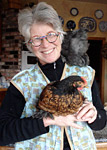
Jane
Aug 12, 2010
|
|

